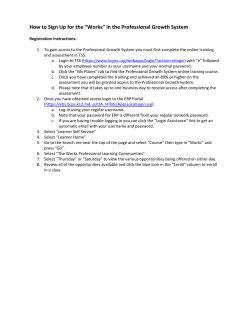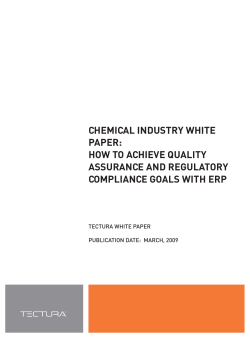
How To Successfully Select An ERP System in Eight Simple Steps An Epicor
An Epicor® White Paper How To Successfully Select An ERP System in Eight Simple Steps How To Successfully Select An ERP System in Eight Simple Steps Introduction An Enterprise Resource Planning (ERP) system is a series of software applications or modules that collects data from your sales, purchasing, finance, inventory, supply chain, manufacturing and quality functions into a common database so that your company can share the information, coordinate activities and collaborate. If you’re looking for your first ERP system or looking to upgrade from an existing system, the evaluation, selection and implementation process is a long-term strategic decision for your organization. The Steps To help you through this process, here are eight simple steps for a successful ERP system selection. Step 1: Evaluation Form an evaluation committee that includes top management, functional experts and end-users from the different departments within your company. Consider hiring external consultants to assist. Throughout the selection process, end each step with a consensus of all members to gain enterprise-wide acceptance of the final ERP system. Step 2: Make An Assessment Assess your existing business processes and the scale of your operation, so you can determine what’s being done well. Identify the gaps or key challenges that can be solved with the help of an ERP system. Step 3: Establish Criteria Develop your selection criteria to evaluate the available solutions. Criteria can include features, price, platform, and anything else your committee can think of. Group the criteria according to importance to your business, i.e. very important, important, and less important. Assign a score to each to make the evaluation easier. Here are some example criteria: • Industry Expertise. How well does the ERP vendor understand your industry? Does the vendor offer industry best practices or pre-defined processes that are generalized or horizontally focused? ERP solutions should at the very least address your mission critical business requirements specific to your industry. • Total Cost of Ownership. Determine the long-term TCO for hardware, software, and support—pre and post implementation. • Multi-Site Operations Support. If you need to collaborate with multiple operations then ensure your ERP vendor can support multi-site operations. Can your ERP vendor support all your locations with a small centralized IT staff? Do they require complicated architectures? • Customer Support. Does the ERP vendor have its own in-house support or does it outsource? You’ll gain the most out of your investment if you have access to a customer care center that can answer your key application and technical 1 How To Successfully Select An ERP System in Eight Simple Steps questions, solve your complex technical or software related issues, and advise on best industry practices. Step 4: Schedule Consultations Arrange a 10-minute phone consultation with both a sales representative and product expert from as many different ERP vendors as possible. This “discovery call” will provide you with better insight on the vendor and its solution than if you were to rely solely on brochures and sales literature. Step 5: Create a Shortlist Shortlist three to five ERP solutions that best meet your business needs. Your discovery calls will have helped you eliminate the solutions which are poor fits. Step 6: Make Contact Contact the vendors of your shortlisted ERP systems to arrange presentations and product demonstrations. Step 7: Prepare Questions That Address Your Concerns How each vendor responds will help you determine the best fit for your company. Step 8: Check Vendor References Visit and consult companies where the ERP system has been implemented. Find out if the system is working as expected, and what the company likes or dislikes. If there were issues, then determine how the vendor resolved them. Conclusion Your evaluation committee should now be able to select an ERP solution based on how well it met your selection criteria, how it performed during the demonstration, and how the references checked out. Finally, with your selected ERP vendor, spend the time to scope the entire project, from start to finish. Work with your ERP vendor to map your critical milestones and chart your course to success. 2 About Epicor Epicor Software Corporation is a global leader delivering business software solutions to the manufacturing, distribution, retail, and services industries. With more than 40 years of experience, Epicor has more than 20,000 customers in over 150 countries. Epicor solutions enable companies to drive increased efficiency and improve profitability. With a history of innovation, industry expertise, and passion for excellence, Epicor inspires customers to build lasting competitive advantage. Epicor provides the single point of accountability that local, regional, and global businesses demand. For more information, visit www.epicor.com. Contact us for more information on Epicor Products and Services +1.800.776.7438 Worldwide Headquarters San Francisco Bay Area 4120 Dublin Boulevard, Suite 300 Dublin, CA 94568 USA Toll Free: +1.888.448.2636 Direct: +1.925.361.9900 Fax: +1.925.361.9999 Latin America and Caribbean Blvd. Antonio L. Rodriguez #1882 Int. 104 Plaza Central, Col. Santa Maria Monterrey, Nuevo Leon, CP 64650 Mexico Phone: +52.81.1551.7100 Fax: +52.81.1551.7117 info@epicor.com Europe, Middle East and Africa No. 1 The Arena Downshire Way Bracknell, Berkshire RG12 1PU United Kingdom Phone:+44.1344.468468 Fax:+44.1344.468010 www.epicor.com Asia 238A Thomson Road #23-06 Novena Square Tower A Singapore 307684 Singapore Phone:+65.6333.8121 Fax:+65.6333.8131 Australia and New Zealand Level 34 101 Miller Street North Sydney NSW 2060 Australia Phone:+61.2.9927.6200 Fax:+61.2.9927.6298 This document is for informational purposes only and is subject to change without notice. This document and its contents, including the viewpoints, dates and functional content expressed herein are believed to be accurate as of its date of publication, November 2012. However, Epicor Software Corporation makes no guarantee, representations or warranties with regard to the enclosed information and specifically disclaims any applicable implied warranties, such as for fitness for a particular purpose, merchantability, satisfactory quality, and reasonable skill and care. As each user of Epicor software is likely to be unique in their requirements in the use of such software and their business processes, users of this document are always advised to discuss the content of this document with their Epicor account manager. All information contained herein is subject to change without notice and changes to this document since printing and other important information about the software product are made or published in release notes, and you are urged to obtain the current release notes for the software product. We welcome user comments and reserve the right to revise this publication and/or make improvements or changes to the products or programs described in this publication at any time, without notice. The usage of any Epicor Software shall be pursuant to an Epicor end user license agreement and the performance of any consulting services by Epicor personnel shall be pursuant to the standard services terms and conditions of Epicor Software Corporation. Epicor is a registered trademark of Epicor Software Corporation. All other trademarks mentioned are the property of their respective owners. Copyright © 2013 Epicor Software Corporation. All rights reserved.
© Copyright 2025






![Mid Western Ontario District Event [Oakville]](http://cdn1.abcdocz.com/store/data/000192548_1-753105a447977030eda8c92bf1e983c6-250x500.png)














